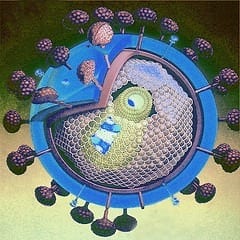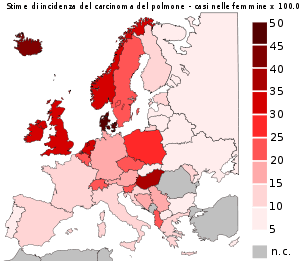
Researchers in Denmark believe that they are on the brink of a breakthrough in finding a cure for HIV “within months”.
The Aarhus University Hospital, in Aarhus, Denmark is conducting clinical trials which will test a “novel strategy” where the HIV virus is stripped from human DNA and then destroyed permanently by the body’s immune system.
The HIV virus must be released from “reservoirs”, which are formed in DNA cells, and brought to the surface of those cells. Once it comes to the surface, the body’s natural immune system can kill the virus by being boosted by a vaccine.
The results of the tests they believe will show that “finding a mass-distributable and affordable cure to HIV is possible,”
the Danish scientists working on the cure said in a statement, it was reported in the Telegraph.
The technique has already been proven to work in laboratory tests and the Danish scientists are currently conducting human trials.
The laboratory tests were so successful that the Danish Research Council has awarded the scientists 12 million Danish Kroner ($2.97 million) to carry out clinical trials on humans.
“I am almost certain that we will be successful in releasing the reservoirs of HIV. The challenge will be getting the patient’s immune system to recognize the virus and destroy it. This depends on the strength and sensitivity of individual immune systems,” Dr. Ole Sogaard, a senior researcher at the Aarhus University Hospital in Denmark, told the Telegraph.
15 patients are currently taking part in the trials and if they respond to treatment they will then be conducted on a wider scale.
However, Dr. Sogaard stressed that combating people’s behavior; such as unprotected sex and sharing needles remained of paramount importance in the fight against HIV and that a cure is not the same as a preventative vaccine.
With current HIV treatment, a patient can live a relatively normal life with few side effects even into old age, but if treatment is topped then symptoms reappear within two weeks.
A cure, as well as saving health services billions of pounds, would remove the need for patients to take continuous HIV medication.
The Danish team is among the most advanced in the world, but the technique is also being researched in Briton, the US and Europe although studies have not yet moved to the clinical trial stage.
Five universities in the UK, Oxford, Cambridge, Imperial, University College London and King’s College have jointly formed the Collaborative Eradication of Reservoirs UK Biomedical Research Centre Group (CHERUB), which is dedicated to finding a cure for HIV.
“When the first patient is cured in this way it will be a spectacular moment. It will prove that we are heading in the right direction and demonstrate that a cure is possible. But I think it will be five years before we see a cure that can be offered on a large scale,” said Dr. John Frater, a clinical research fellow at the Oxford University Nuffield School of Medicine, a member of the CHERUB group.
The Latest Bing News on:
HIV cure
- Study highlights importance of early interventions to combat HIVon April 30, 2024 at 4:31 am
Researchers have investigated the impact of treatment initiation timing on the characteristics of HIV reservoirs, a major obstacle to eradicating the virus.
- US reports first-ever case of cosmetic needle transmitting HIVon April 30, 2024 at 4:27 am
An investigation was launched after a woman diagnosed with HIV in 2018 disclosed having received a procedure involving needles at the spa.
- PrEP4All to host ‘no pants’ fundraiser for HIV prevention advocacyon April 29, 2024 at 3:20 pm
PrEP4All, an organization fighting for equitable access to HIV prevention and treatment, is planning to host a “No Pants Gala” fundraiser in Manhattan on May
- From awareness to action: Mobilizing for HIV/AIDS awareness dayson April 29, 2024 at 10:22 am
HIV is one of many preventable chronic health issues causing suffering in the world today. Yet, unlike others, HIV involves a stigma that makes treatment and prevention challenging. From the earliest days of the epidemic’s onset decades ago, those living with HIV have faced shame, blame, and judgment.
- Gilead expands FDA label for Biktarvy with Phase I pregnant HIV patient dataon April 29, 2024 at 6:52 am
The expanded approval of Biktarvy was based on the Phase I trial data showing efficacy in pregnant HIV-positive individuals.
- Effective ART adds 33 years to lifespan of HIV people, say expertson April 27, 2024 at 7:01 pm
As countries work assiduously to achieve epidemic control of the Human Immunodeficiency Virus, medical experts have said effective use of Antiretroviral Therapy popularly known as ART adds at least 33 years to the lifespan of people living with HIV on therapy.
- New ACTG Trial Aims to Control HIV Without the use of ARTon April 25, 2024 at 12:53 pm
Judith Currier, M.D., M.Sc., ACTG Chair, discussed the trial, how it’s different than previous research and the connotations surrounding the “cure” to HIV.
The Latest Google Headlines on:
HIV cure
[google_news title=”” keyword=”HIV cure” num_posts=”10″ blurb_length=”0″ show_thumb=”left”] [/vc_column_text]The Latest Bing News on:
HIV
- Semaglutide alleviates metabolic-linked liver disease in people with HIVon April 30, 2024 at 10:51 am
For people with HIV (PWH), semaglutide is effective for metabolic dysfunction-associated steatotic liver disease (MASLD), according to a research letter published online April 30 in the Annals of Internal Medicine.
- 3 Women Contracted HIV From Vampire Facials. Here's What You Need to Knowon April 30, 2024 at 6:49 am
3 patients who received platelet-rich plasma (PRP) microneedling procedures, or “vampire facials” at VIP Spa in New Mexico, contracted HIV due to negligence and unsanitary facilities, according to the CDC’s Morbidity and Mortality Weekly report ...
The Latest Google Headlines on:
HIV
[google_news title=”” keyword=”HIV” num_posts=”10″ blurb_length=”0″ show_thumb=”left”]










